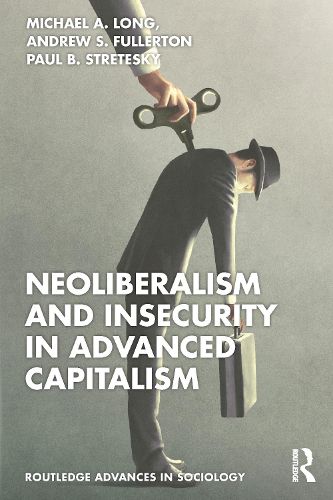Readings Newsletter
Become a Readings Member to make your shopping experience even easier.
Sign in or sign up for free!
You’re not far away from qualifying for FREE standard shipping within Australia
You’ve qualified for FREE standard shipping within Australia
The cart is loading…






This book examines the relationship between neoliberalism and insecurity, beginning with the post-World War II period and continuing up through the present. Neoliberalism - the dominant political economic perspective that elevates competition above all else at both the structural and individual levels - has increased the amount of insecurity (e.g., food, energy, job) across the world. It provides a theoretical and empirical analysis of how and why neoliberalism and insecurity have become intertwined over the last half century.
The book takes a novel approach to the study of neoliberalism, insecurity, and their intersection. First, in addition to examining specific types of insecurity, the overall concept of insecurity is defined and theorized as a fundamental part of neoliberal capitalism. Second, to help bypass the structural versus individual binary that has come to characterize much of the neoliberalism literature, a field-theoretic framework, heavily influenced by the work of Pierre Bourdieu, is employed.
As such, it will be of great interest for researchers in neoliberalism, insecurity, and Bourdieu's theory of practice, including advanced undergraduate students and graduate scholars from sociology, anthropology, geography, political science, and public health.
$9.00 standard shipping within Australia
FREE standard shipping within Australia for orders over $100.00
Express & International shipping calculated at checkout
This book examines the relationship between neoliberalism and insecurity, beginning with the post-World War II period and continuing up through the present. Neoliberalism - the dominant political economic perspective that elevates competition above all else at both the structural and individual levels - has increased the amount of insecurity (e.g., food, energy, job) across the world. It provides a theoretical and empirical analysis of how and why neoliberalism and insecurity have become intertwined over the last half century.
The book takes a novel approach to the study of neoliberalism, insecurity, and their intersection. First, in addition to examining specific types of insecurity, the overall concept of insecurity is defined and theorized as a fundamental part of neoliberal capitalism. Second, to help bypass the structural versus individual binary that has come to characterize much of the neoliberalism literature, a field-theoretic framework, heavily influenced by the work of Pierre Bourdieu, is employed.
As such, it will be of great interest for researchers in neoliberalism, insecurity, and Bourdieu's theory of practice, including advanced undergraduate students and graduate scholars from sociology, anthropology, geography, political science, and public health.